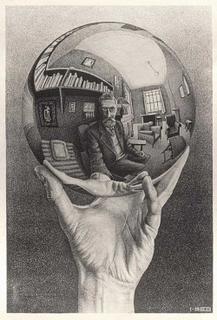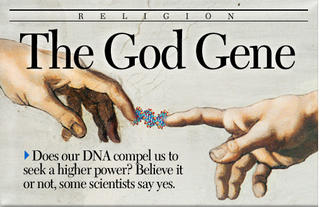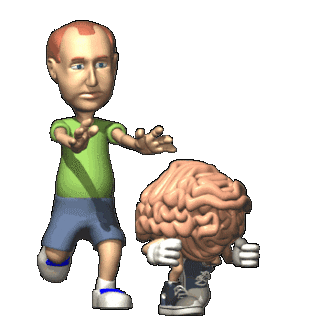 5
comments
|
Friday, September 30, 2005
5
comments
|
Friday, September 30, 2005
Am I just a material being?—composed simply of a body, a brain, and a central nervous system—or is there something more to me? This is an important question. The soul is a necessary quality of the living human entity. Without the soul, a person isn’t a person; they are just a lump of meat. The soul is the quality that gives one personhood.
So, what exactly is the Soul? The soul is the immaterial “you.” Some of you may be wonder if there is any evidence of such a thing as a “soul.” Let’s take a look.
Evidences for the Soul
Dualism
One thing to note is that if we are only composed of physical properties, when the body dies, we die. The assertion that there is no difference between the mind and the brain, and that chemical reactions and physical processes is all that goes on in the brain—is physicalism. In other words, consciousness is a mere property of the brain. It is produced by the brain and is dependent on the brain.
However, if “dualism” is the accurate representation, then we have both bodies and a soul. To put it this way, in dualism, there is an immaterial you and it cannot be tested with scientific tools. You can’t put the soul into a test tube and measure it. The soul, gives the body life and houses the body, but not in a local way, because it is immaterial.
According to scientific studies, all the matter in your body changes (I think it was somewhere around every 7-9 years) at the atomic level, these changes include your brain. I know that I have physically changed drastically within the past decade (probably not for the better). However, if we are just physical and nothing else that means I am not the same “me” I was and I am a different person. First thought, crazy. Of course I am the same person. If we conceded to physicalism, we can reject many of our common sense ideas. Take for example your baby pictures. If you change every decade, your baby pictures are not really you; the person in the picture has a different body than you do.
Yesterday, I just signed up for a 401K at work (and a mighty reasonable one at that). But if I am only physical, and I know I am going to change, why bother with the 401K? I bother, because I know I will still be me, even though my body changes. This is only possible if there is something that remains the same throughout your whole life, not something material, but immaterial. The soul.
Some of you may be thinking that we have no scientific evidence that there is a soul. Therefore there is no soul. We can’t open anything physical about you like the brain and find the soul. If we cannot sense it, then why should we believe it exists?
Science is insufficient
Science by its very nature can't disprove a soul's existence because science deals with the physical and is not equipped to measure the non-physical.
Greg Koukl comments on the “scientific position” to address the soul. He says,
Science doesn’t tell us everything we know; in some cases, we must trust our reason. For example, in mathematical knowledge, we rely on evidence of reason based on certain universal mathematical principles, which are not empirical.
This is what I hear when people try to say there is no scientific evidence for the soul: “You said there was an invisible man in your house, but I went inside, looked everywhere, and I couldn’t find him.” Clearly, empirical evidence is ineffectual when looking for the soul. Therefore, any objection of the existence of the soul due to lack of empirical science only states there is no “physical evidence."
The correspondence relationship
As evidence for physicalism, it is often pointed out that for every so-called mental event, a corresponding change in brain activity can be demonstrated. From this it follows, it is said, that physical and mental events are the same-that is, what appear to be mental entities are simply physical entities (that is, physical properties, events, and substances)--and thus dualism is false.
If dualism is true there is a connection between brain (the physical organ in our heads) activity and mental activity (the activity of our souls). But connection is not identity. As J.P Moreland says, "...just because A causes B (or vice versa), or just because A and B are constantly correlated with each other, that does not mean that A is identical to B"
So the correlation between brain activity and mental events can be easily accounted for by recognizing that the mental and physical interact with one another and so influence one another. Thus, what happens in the physical brain influences and is reflected in the non-physical soul; likewise, what happens in the non-physical soul influences and is reflected in the physical brain. If the brain or physical body becomes limited (brain injury), so shall the soul be limited to have connectivity. For example, alcohol and drugs cause chemical reactions to the brain, thus hindering the soul’s ability to “connect” to the physical. But connection is not identity. The precise methodological relationship and function of interaction between the body and soul is unknown. But what follows from that? It certainly does not discount the existence of the soul.
Introspection
Nobody argues that we have no conciseness. Secondly, through introspection and self examination, we know about our own internal mental states. Most of our internal states are self-evident. But is a consciousness just complex physical state of the brain? No.
Philosopher Thomas Nagel makes this quite clear:
It is not a far stretch at all to suppose that bats are conscious. Suppose someone had perfect physiological knowledge of bats. It would follow, then, that if consciousness were merely a complex physical state, then that person would know exactly what it would be like to be a bat. However, it seems clear that all the knowledge in the world about bats could not tell someone what it is like to be a bat.
Objective facts are accessible to anyone. Consciousness is not accessible to anyone but the individual person. If we were merely physical beings, conciseness should be accessible to anyone. However, this is not the case; therefore, it is clear that the “mind” is not physical.
The Freedom of Choice and Determinism
It‘s clear from our awareness of our choices that we have free wills to do and act in any way we choose. We can choose to have pizza with pepperoni, or sausage (or both) these choices seem quite undetermined. When it comes to physical states, they are determined by other physical states, governed by physical laws. If it is the case that our minds are simply physical states, then we are not free. All of our decisions are determined.
Take a moment and think of all the choices you have made in your life. Your choices make you into the person you are. Why should you accept that the decisions you make are simply random events that you had no control over? A purely physicalist worldview limits us to this quandary. So, therefore, if you don’t believe in the soul, it’s because you are predetermined not to, and if you do it’s because you were determined to. So, if all are decisions are predetermined, any view you hold is not a result of reasoning. If this is the case, what are we quarreling about? We can’t choose our beliefs anyway, and to try to persuade—would be futile. Our free will choices make us unique and give us identity.
Near Death Experiences
There is another area of evidence that must be considered--Near Death Experiences (NDE). Roll your eyes if you want, but there is an interesting phenomenon that is valid. But I am not talking of just subjective experiences that can neither be proved nor disproved; I am talking about verifiable statements.
Dr. Raymond Moody documents some of these facts. Here are three verifiable examples recorded by Moody:
Example 1:
An elderly woman had been blind since childhood. But, during her NDE, the woman had regained her sight and she was able to accurately describe the instruments and techniques used during the resuscitation her body. After the woman was revived, she reported the details to her doctor. She was able to tell her doctor who came in and out, what they said, what they wore, what they did, all of which was true. Her doctor then referred the woman to Moody who he knew was doing research at the time on NDEs.
Example 2:
One patient told Moody, “After it was all over the doctor told me that I had a really bad time, and I said, ‘Yeah, I know.’ He said, ‘Well, how do you know?’ and I said, ‘I can tell you everything that happened.’ He didn’t believe me, so I told him the whole story, from the time I stopped breathing until the time I was kind of coming around. He was really shocked to know that I knew everything that had happened. He didn’t know quite what to say, but he came in several times to ask me different things about it.”
Example 3:
In another instance a woman with a heart condition was dying at the same time that her sister was in a diabetic coma in another part of the same hospital. The subject reported having a conversation with her sister as both of them hovered near the ceiling watching the medical team work on her body below. When the woman awoke, she told the doctor that her sister had died while her own resuscitation was taking place. The doctor denied it, but when she insisted, he had a nurse check on it. The sister had, in fact, died during the time in question
There are many more examples that could be shown. If these experiences were only firing neurons or physical dispositions, how did they know and describe the things that they did? There are far too many documented cases to write it off as a hoax. These experiences could only take place if you are not your body.
Who Cares?
I do have a soul; what are the implications for the decisions I make today? The amount of time you are on earth (even if you live 100 years), compared to eternity, is incomprehensible. When you die, your deeds will be evaluated against the purpose for which you were originally created. Many people already evaluate themselves; others evaluate them this way also. But it is your creator to which the final reckoning must be given, the one who "began" you. It’s worth investing your time and effort to investigate and secure you eternity. This is why one should care about the soul.
Hebrews 9:27: "And as it is appointed unto men once to die, but after this the judgment"
Romans 14:12: "So then every one of us shall give account of himself to God."
Labels: Apologetics, Philosophy




